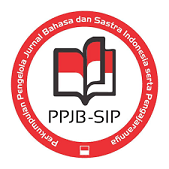PENERAPAN MODEL PEMBELAJARAN KOOPERATIF TIPE STUDENT TEAMS ACHIEVEMENT DIVISION (STAD) UNTUK MENINGKATKAN KEMAMPUAN MENULIS PARAGRAF EKSPOSISI SISWA KELAS VIII SMP MUTIARA SINGARAJA
DOI:
https://doi.org/10.23887/jjpbs.v7i2.15157Abstract
Penelitian Tindakan Kelas ini bertujuan untuk mengetahui (1) langkah-langkah penerapan model pembelajaran koopertif tipe Student Teams Achievement Division (STAD) untuk meningkatkan kemampuan menulis paragraf eksposisi siswa kelas VIII SMP Mutiara Singaraja, (2) hasil belajar menulis paragraf eksposisi menggunakan model pembelajaran kooperatif tipe Student Teams Achievement Division (STAD) pada kelas VIII SMP Mutiara Singaraja. Penelitian ini merupakan penelitian tindakan kelas. Subjek penelitian ini adalah siswa kelas VIII SMP Mutiara Singaraja dan objek yang dikaji adalah penerapan model pembelajaran STAD untuk meningkatkan kemampuan siswa menulis paragraf eksposisi, dan kemampuan siswa dalam menulis paragraf eksposisi. Metode pengumpulan data yang digunakan adalah metode observasi dan metode tes. Data dianalisis dengan teknik analisis data kualitatif dan kuantitatif. Berdasarkan analisis hasil penelitian yang telah dilakukan, ditemukan dua hal berikut, (1) Langkah-langkah penerapan model pembelajaran kooperatif tipe STAD dalam menulis paragraf eksposisi adalah siswa dibagi menjadi beberapa kelompok heterogen, setiap kelompok menentukan satu tema bebas untuk dikembangkan, perwakilan kelompok mempresentasikan pekerjaannya, siswa kembali ke bangku masing-masinguntukmenerima tes. (2) Hasil belajar siswa dengan menggunakan model pembelajaran kooperatif tipe STAD terbukti dapat meningkat. Skor rata-rata siswa pratindakan adalah 69,77. Pada siklus I, skor meningkat menjadi 77,41, dan meningkat lagi pada siklus II menjadi 83,90. Oleh karena itu, peneliti menyarankan agar model pembelajaran ini dapat diterapkan oleh guru bahasa Indonesia untuk meningkatkan kemampuan menulis paragraf eksposisi siswa.Kata Kunci : pembelajaran kooperatif, STAD, meningkatkan, eksposisi
The aim of research action class is (1) to know about the steps of cooperative learning type STAD to improve the student skill in writing exposition paragraph at VIII grades of SMP Mutiara Singaraja. (2) the learning outcomes of this writing skill in exposition paragraph use learning cooperative type STAD at VIII grades of SMP Mutiara Singaraja. This research is research action class. The subject of this research is students at VIII grade of SMP Mutiara Singaraja and the object implemented strategy type STAD to improve student skill in writing exposition paragraph. The method 1of collecting data which which is used are observation and test methods. The data analysis technique of quantitatif and qualiaif. Based on e learnin oucomes f e daa analsis wic is done (1) the steps of the implementation learning cooperative type STAD in writing exposition paragraph is the students dividied info severval heterogen groups, later on each groups determine the theme, after presented, the students back to their own sit,.at least determine gives the test to know about the students outcomes.The students outcommes in stad. (2) the result of the students learning type STAD is improve the students writing exposition paragraph. The average score of the students in preaction is 66,77. On the 1st siklus increase to 77,41 and 83,90 on the 2nd siklus. This research may implemented in the classroom by the teacher the improve students writing exposition.
keyword : learningcooperative, STAD, improving, exposition
Published
2018-07-26
Issue
Section
Articles
License
Authors who publish with the Jurnal Pendidikan Bahasa dan Sastra Indonesia Undiksha agree to the following terms:- Authors retain copyright and grant the journal the right of first publication with the work simultaneously licensed under a Creative Commons Attribution License (CC BY-SA 4.0) that allows others to share the work with an acknowledgment of the work's authorship and initial publication in this journal
- Authors are able to enter into separate, additional contractual arrangements for the non-exclusive distribution of the journal's published version of the work (e.g., post it to an institutional repository or publish it in a book), with an acknowledgment of its initial publication in this journal.
- Authors are permitted and encouraged to post their work online (e.g., in institutional repositories or on their website) prior to and during the submission process, as it can lead to productive exchanges, as well as earlier and greater citation of published work. (See The Effect of Open Access)







